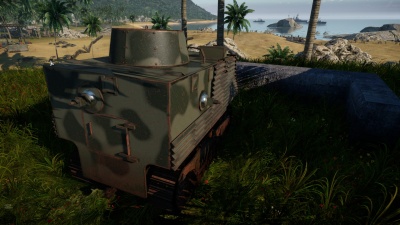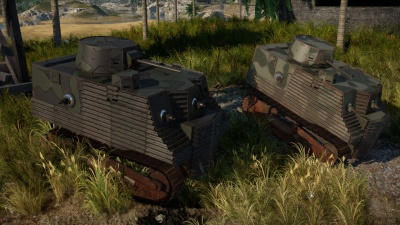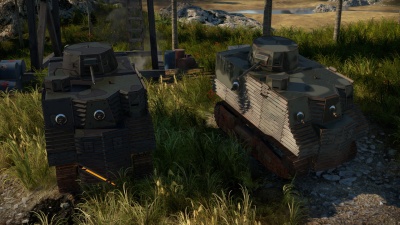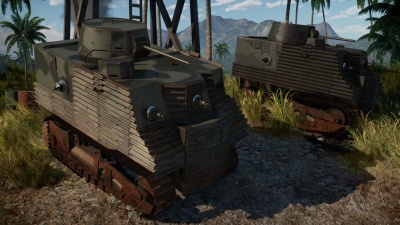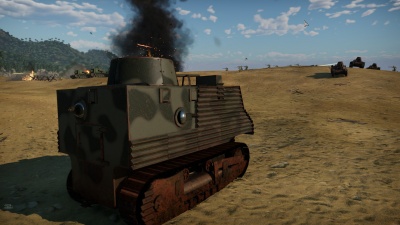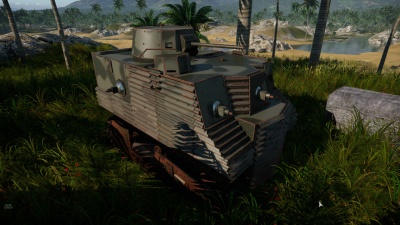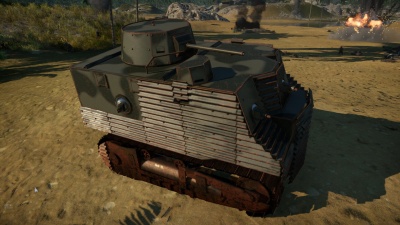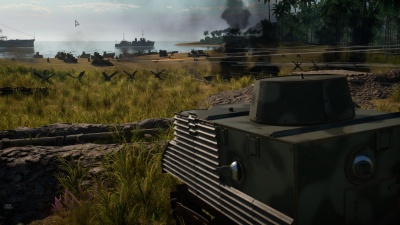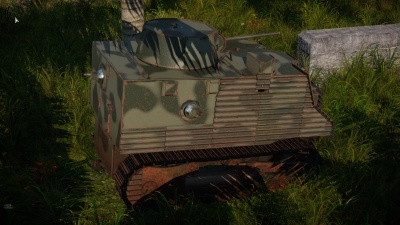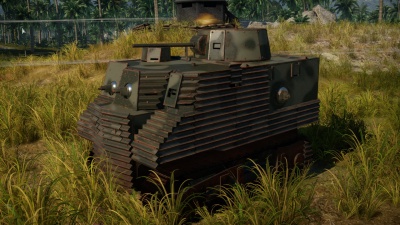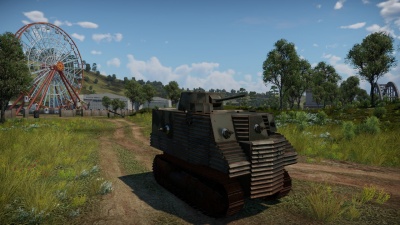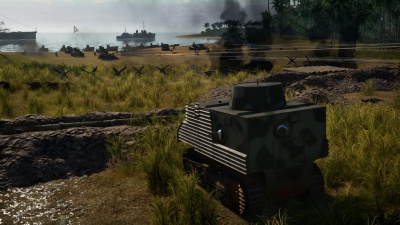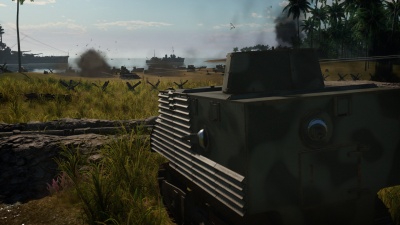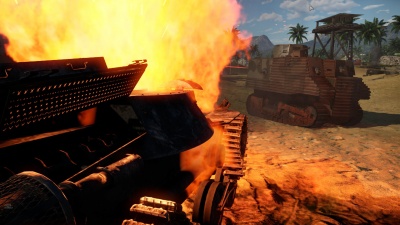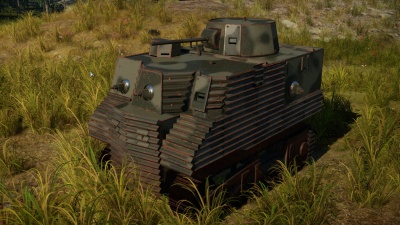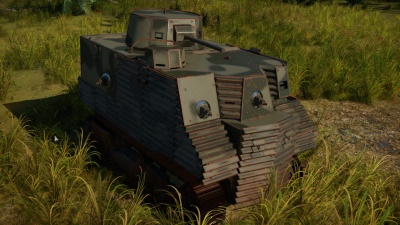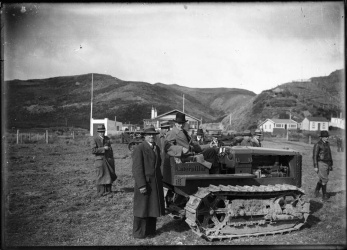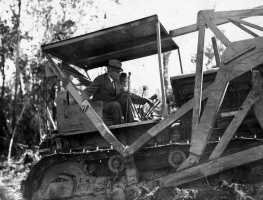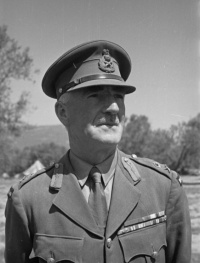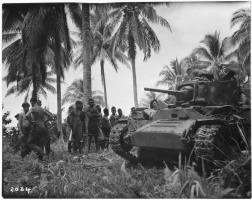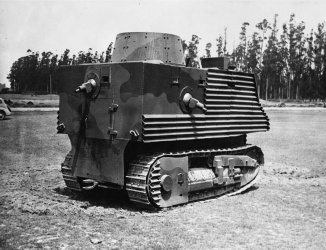Bob Semple
| Hello War thunder players, we would appreciate your feedback on the wiki - this will only take a couple of minutes to complete. It will allow us to create an even better wiki for you! Click here |
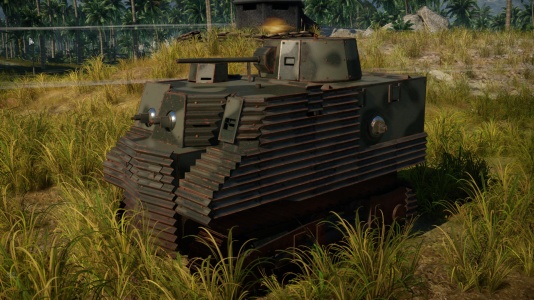
Contents
Description
The Bob Semple, also known as "Big Bob", "Big Bob Tank", "Super Bob", "Kiwi Tank" or "Kiwi Fruit", is a user-made vehicle.
General info
Survivability and armour
The Bob Semple offers limited crew protection with its maximum armour weighing two tons. The armour offers protection up to 12.7 mm, only providing protection from light machine guns. Cannons and heavy machine guns will be able to penetrate the tank and knock out its crew.
Unlike other tanks, the Bob Semple tank offers six crew members, some land battleships such as the Landkreuzer P. 1000 Ratte, Independent, T-35 offer this complement.
The Semple's 37 mm turret does not have any extra armour, it cannot ricochet shells. However due to the thin turret armour, which is 8 mm thick, high velocity shells will over-penetrate and only knock out the gunner. Due to the Bob Semple’s incredible complement of six crew members, replacing the knocked-out gunner is no problem.
One of the Bob Semple’s major weaknesses is that it has no turret-mounted anti-air defence. The Semple’s roof armour is also incredibly thin. Fighters with .50 calibre machine guns, such as the P-51 Mustang, can penetrate through the Semple’s roof armour and knock out the entire crew. Another scenario that would exploit this weak roof armour is if the Semple encounters a Strf 9040 BILL with its Rbs 56 ATGMs, which can easily shoot a missile over the Bob Semple to explode then penetrate down through the roof, knocking out the Semple’s crew.
Being based on a RD8 tractor, it can plough the fields with its machine guns, if being a tank doesn’t work out. It can also replace the scarecrows on fields and scare away those scary kiwi birds that might try to eat those freshly grown kiwis!
Mobility
Maximum speed for the Bob Semple tank with just machine gun armaments up to 24 km/h, provided by its lightning fast 5 hp per ton ratio. With the addition of the 37 mm, the top speed is slightly reduced compared to its maximum.
Modifications and economy
Repair costs are cheap due to the efficient use of resources in the construction of the Bob Semple.
Armaments
Main armament
This Bob Semple features its original M5 37 mm cannon. The M5 cannon is the same cannon you can already find on vehicles from the M3 Lee, M3 Stuart
Ammunition
| Penetration statistics | |||||||
|---|---|---|---|---|---|---|---|
| Ammunition | Type of warhead |
Penetration @ 0° Angle of Attack (mm) | |||||
| 10 m | 100 m | 500 m | 1,000 m | 1,500 m | 2,000 m | ||
| M74 shot | AP | 67 | 65 | 56 | 46 | 38 | 32 |
| M74B1 | AP | 79 | 76 | 65 | 54 | 45 | 37 |
| M51 shot | APCBC | 75 | 72 | 62 | 51 | 43 | 35 |
| M51B1/B2 | APCBC | 87 | 84 | 73 | 60 | 50 | 41 |
| Shell details | |||||||||
|---|---|---|---|---|---|---|---|---|---|
| Ammunition | Type of warhead |
Velocity (m/s) |
Projectile Mass (kg) |
Fuse delay (m) |
Fuse sensitivity (mm) |
Explosive Mass (TNT equivalent) (g) |
Ricochet | ||
| 0% | 50% | 100% | |||||||
| M74 shot | AP | 792 | 0.87 | N/A | N/A | N/A | 47° | 60° | 65° |
| M74B1 | AP | 883 | 0.87 | N/A | N/A | N/A | 47° | 60° | 65° |
| M51 shot | APCBC | 792 | 0.87 | N/A | N/A | N/A | 48° | 63° | 71° |
| M51B1/B2 | APCBC | 883 | 0.87 | N/A | N/A | N/A | 48° | 63° | 71° |
Machine guns
In the foliage environment that the Bob Semple may find itself in, anything can be the enemy. The Japanese may be stalking under the dense brush, or the trees may speak. Therefore, the Bob Semple comes bristling with up to five Bren machine guns on all sides of the tank. That way, maximum response time can be taken to take out any pesky foe that dares come up against the might of the Bob Semple.
Usage in battles
Let's talk about something very unique: The Bob Semple comes with two missions, both are very fun. One mission features the defence of New Zealand and a special mission to train yourself on how to play this tank on the training ground.
Defence of New Zealand
Defence of New Zealand is about defeating the Japanese invasion, which has invaded the pacific region. In this mode, you are the last line of defence, you shall fight against A.I. tanks, planes and ships. Whilst you play the defender and support your A.I. team to fight off this invasion. It is incredible fun, you get to play the Bob Semple! Fire it cannons and machine guns, push the troop landing ships back into the ocean, but if you push too hard, you shall join them alongside shooting down airplanes and sinking enemy ships.
To achieve victory, Bob Semple must survive. It is not easy, but it can be done, victory shall be yours.
Media Defence of New Zealand
In Game images
Training Ground
Training Ground allows you to explore and see other vehicles, items such as giant foot balls, special items and planes flying overhead. The great thing about training group map is, you can really see how big the Bob Semple is - Almost as big as a Maus and taller than a M1A2 Abrams MBT. You can also duel another Bob Semple, however that Bob Semple is not easy to be knocked out, you must learn the weak spots to take it out of action while the other vehicles hunt you down.
Super Bob Semple
Well let’s talk about this, bob has been upgraded - the New Zealanders have found a time machine and they have used it. Don’t worry, the past is still kind of the same, but the only difference is now New Zealand has CIWIS systems and Derp Cannons that would make KV-2 cry. Poor old Bob Semple has now become the Big Bob Semple, it’s still the same size but it features AK-630’s and 152 mm HE shells.
Pros and cons
Pros:
- It's the Bob Semple Tank.
- Great firepower with its 37mm M5 cannon, is able to destroy Tiger tanks.
- Five machine guns, able to cover the Bob Semple tank with protective fire!
- User-made vehicle.
- Six crew members, providing great gunner crew replacement capabilities in battles
Cons:
- You now need to find a new tank to pester social media & forum team with
- Awfully slow, based on an agricultural tractor.
- Its two tons of corrugated steel roofing panels masquerading as armour plate, its worthless.
- Remarkably tall, it's a great big target – cannot use the terrain as cover. It’s almost as tall as a Maus!
- The Six pack of bushes cannot cover the front of the tank.
- Does not come with kiwis. Fruits not included - You can find some nice hats on the War Thunder Market.
History
Robert "Bob" Semple
Rober “Bob” Semple was born in Sofala, New South Wales, Australia, on 21 October 1873. He attended the school in Sofala but began working at the Lithgow coal mines when he was only nine years old. He worked in various mines throughout the 1880’s and 1890’s. On 27 June 1898, Robert Semple was married to Margaret MacNair in Outtrim, Victoria. They moved around for a while after settling down originally in Western Australia then Victoria before ending up in Gippsland. It was there that he was involved in a miners’ strike in 1903 which was defeated. Blacklisted after the strike, Semple left the country for New Zealand’s South Island.There, Semple was employed at the state owned Runanga coal mine. Semple became embroiled in the coal miner unionism of the time. He became the president of the Runanga Miners’ Union by 1907. In 1913 he was arrested for supporting the thought of a nation wide coal miner strike, and he moved to Wellington after his release. In 1916 he was once again arrested and served 12 months of jail time for speaking out against conscription. In 1918 he was elected as a representative from Wellington South to the New Zealand Parliament, representing the New Zealand Labor Party. In 1919, Semple was not reelected to his position in parliament. In 1925 he ended up as the Labour representative to the Wellington City Council until 1935. He once again was elected to the New Zealand Parliament in 1928.In 1935, Robert Semple was chosen by the newly elected Prime Minister M. J. Savage as his Minister of Public Works. When the Second World War began, Semple and his Ministry of Public Works spearheaded the development of a domestic armoured fighting vehicle which would end up taking his name. In 1941 he became the Minister of Railways. He served in the position of Minister of Public Works until 1943.
After the end of the Second World War, Semple continued his public service, continuing to serve as the Minister of Railways until 1949 and continuing to serve in the Parliament. He took a very hard stance on Communism, warning the nation to guard against communism and its influences. He became ill and retired in 1954 after serving in the Parliament since 1928. He died on 31 January 1955, survived by his wife, two sons, and two daughters.
Idea/concept
Since New Zealand was in danger of a potential Japanese invasion during the Second World War, the NZ Ministry of Defense began looking for a potential tank with which to defend itself. Bob Semple, then the New Zealand Minister of Public Works, saw a photograph of a tractor tank conversion built in the United States. This inspired him to begin the process to design a domestic New Zealand tractor-tank conversion, one which would later take his name.Note: It is quite possible that the American tractor tank Semple saw was the Disston Tractor Tank which was produced in the US during the 1930s. The Disston Tractor Tank was sold to Afghanistan and marketed to other nations such as Kuwait and Romania. Some of the Afghan Disston Tractor Tanks still exist today in varying states of disrepair in Afghan scrap yards.
Testing
The first trials of the Bob Semple were carried out in December 1940 at Burnham Camp. More testing was carried out in August of 1941. It was fired upon by machine guns to test the general protection, and then by carefully aimed shots to determine more specific weaknesses. One concern was that the machine gun ports proved to allow shrapnel or bullets into the tank. The next phase of testing began on 8 October 1941. General Edward Puttick, the New Zealand Chief of General Staff, was there to witness the testing. He had seen combat in the Mediterranean theater and so was an experienced officer.
During testing, the design proved to have sufficient mobility and armament, but the greatest concern was the height of the vehicle. The turret itself added over two feet to the vehicle so General Puttick recommended that it be removed to reduce the overall height, especially since the turret only added one machine gun to the total armament which was seen as redundant due to the multiple other machine guns in the hull. Additionally, Puttick noted that the vehicle would be too heavy to cross some bridges and therefore would have to ford streams. Another factor worthy of note was the off-road stability of the tank. When moving off-road the tank was very unstable which resulted in very poor on-the-move accuracy.
What happened to it after this?
Two of the Bob Semple tanks were given to the New Zealand Army at some point with their turrets removed, since no cannon had been acquired which would be suitable for the turret. The threat of Japanese invasion faded during the war, and with the delivery of British-manufactured Valentine tanks and local production of the Bren Carrier, there was no longer a need for the local development of a tank. General Puttick recommended that the program be closed and production end, while the ones that were built could be used simply for beach defense.
The two tanks that were given to the New Zealand Army had their armour removed and were able to be returned to civilian use. The third, which had previously remained at Auckland, was supposedly used in the Pacific with a dozer blade fitted but there unfortunately isn’t any photographic evidence.
None of the three Bob Semple tanks survive to this day, at least in the military form.
Fatal Flaws
Due to the Bob Semple tank being built on the basis of a tractor, the armour was relatively light. At most it protected from heavy machine gun or 20 mm cannon fire, but even rifle caliber ammunition could penetrate through the machine gun ports. The tractor base also limited the mobility as the driver had to bring the vehicle to a full stop in order to even shift gears. With the heavy weight of 18 tons with the turret mounted, the Bob Semple could only reach a speed of 7.5 miles per hour or about 12 kilometers per hour.
Not only did the tractor basis limit the armour and mobility of the Bob Semple, but the vehicle was very tall at 12 feet with the turret mounted. This made it a very large target for enemy fire. The firepower of the Bob Semple was also sub-par, consisting only of six .303 calibre Bren machine guns. No heavier anti-tank or infantry support weapon was mounted due to a lack of supply.
Also, it can be seen from video and photographic evidence that the Bob Semple tank did not feature a hatch of any sort on the turret roof. This would mean that the vehicle crew would have a very limited view of their surroundings and also that the turret crew would have to exit the vehicle through the single rear door, meaning they would have a very hard time escaping the vehicle if it was on fire.
These factors, combined with the boxy and ungainly appearance, contributed to a public opinion of ridicule towards the Bob Semple tank, which lasts to the modern day. Despite this, the Bob Semple tank could be viewed as a success due to the semi-acceptable characteristics as viewed by the New Zealand Army. For a conversion from a civilian vehicle, the Bob Semple was an impressive feat of New Zealand ingenuity.
Semple is quoted as saying:
|
That tank was an honest-to-God effort to do something with the material at our disposal when raider were at our back door…instead of sitting down and moaning we felt we ought to do something to manufacture weapons that would help to defend our country and our people.[1] |
Bob Semple Tank (37 mm Gun)
It was always envisioned by the New Zealand Army that the vehicle would be fitted with a 37 mm gun in the turret. Unfortunately, weapons of that type, such as the British 40 mm QF 2 pounder gun, were in very short supply, so a 37 mm gun was never fitted and was replaced in the turret by a .303 caliber Bren machine gun (the turret was later removed when the vehicles were delivered to the New Zealand Army). It is unknown exactly what tank gun was considered by the New Zealand Army to be fitted in the Bob Semple, but it is quite possible that the American 37 mm M3 anti-tank gun - used on the American M3/M5 Stuart as well as the M8 Greyhound - was considered.
How do you play this?
To play the Bob Semple, click here, download and install - Now you can play the Legendary Bob Semple - This was created by Matizo14 & MaxWar42, make sure you follow them on live.war thunder too!
Click here: To download and play this great fun user model and mission
Click here to download, share yours and find more: On live.warthunder.com
If you would like to make your own missions, vehicles and skins please check out the War Thunder CDK. Remember: If your skins and vehicles are selected to be in-game, you can earn money for them!
- Want to learn more, have a question, need help? The War Thunder community has your back! get involved with the community [forum.warthunder.com]
| This article was written by the members of the Wiki Share Program Team - We appreciate everything you do to make our War Thunder Wiki the best source of knowledge for our in-game vehicles.
We all hope you have a great day, stay safe during the pandemic, and we look forward to reading your edits. Maybe you will be a part of this team one day? - Have a great April Fools day, everyone! War Thunder Wiki Team. |
Media
See also
- Landkreuzer P. 1000 Ratte - The only other legendary vehicle that can match the might of the Bob Semple.
External links
- References
- ↑ "Criticism of Tanks, Mr. Semple in Reply."New Zealand Herald, 29 Oct 1941, p. 6


